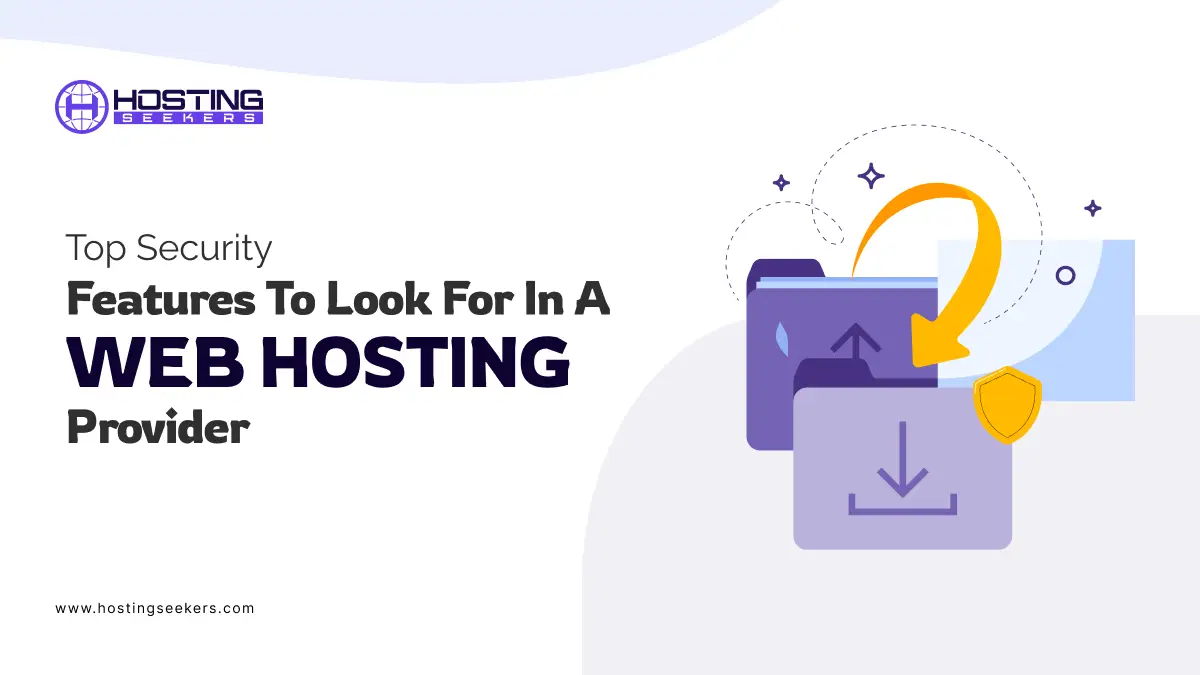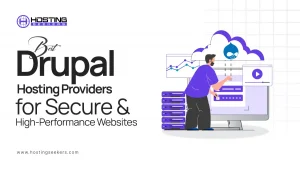
Top Security Features to Look for in a Web Hosting Provider
Web Hosting Tips Updated on : May 16, 2025Table of Content
If you’re planning to launch a website, security is something you can’t afford to ignore. You might be all about the design, content, speed, or any other element, but without the right web hosting security features, all your hard work will be at risk. Think of your web hosting provider as the foundation for your website—a strong one that keeps your data and visitors safe when coming to the site and makes sure your site runs fluidly even under threat.
Read this blog to learn how web hosting works, types of services, and, more importantly, what security features to look for while choosing the service. Whether you’re using traditional hosting or are into the cloud computing way of providing web hosting, the goal is still the same: to have your site protected at all times.
What is Web Hosting?
It enables your website to be live on the Internet. It could be compared to renting space on the Internet to store all your website’s files, images, and content. Without this hosting, your site would not appear when someone types that address.
To define hosting, it’s a service that gives your website a home. When people ask, “What is hosting and domain?”, the domain is your address (like www.example.com), and hosting is the house where all your website data lives.
There are different types of web hosting, such as shared hosting, VPS, and web hosting with cloud computing, varying in performance levels, control, and pricing depending on your needs. So, if you are looking for web hosting examples, popular providers like Bluehost, HostGator, SiteGround, etc., are some common names. These platforms handle the hosting details behind the scenes so your site stays up and running smoothly.
How does web hosting work?
Your website’s text, images, and code are all stored on a special computer server. When someone puts your site’s name into their browser, that server serves up your site’s information to their screen so they can view it. Think of it this way: your website lives on a server, and hosting is the place that lets other people watch it at any time, hassle-free.
These servers do not belong to you and are managed by your web hosting provider. They take care of all the technical hosting details so your site can stay up and running, be fast, and keep all the information secure. Some even use a kind of web hosting with cloud computing so the website is not stored on one server but across various servers. This makes your site more reliable and can handle more visitors without crashing.
Types of web hosting services
In order to acquire a site, one must select and obtain an effective hosting service. We will discuss the various kinds of web hosting and what separates them so that you can make a well-informed decision about the most suitable for you.
1. Shared Hosting
This is the most beginner-friendly option. Your website shares server space and resources (like memory and CPU) with others. It’s affordable, but slower if your neighbors get a lot of traffic.
Best for: Small websites, blogs, or anyone just starting out.
2. Virtual Private Server (VPS) Hosting
In this type, your site still shares a server, but you get your own dedicated section. With it, you have much more control and power than shared hosting. Think of it as a middle ground.
Best for: Growing websites that need more performance.
3. Dedicated Hosting
You get the entire server to yourself. It’s powerful, fast, and customizable—but also more expensive.
Best for: High-traffic websites or businesses that need full control over their server.
4. Cloud Hosting
It utilises the cloud, a network of servers, to host your website. If one server fails, another takes up the load. It’s flexible and scalable, so it’s great for handling those sorts of traffic spikes.
Best for: Sites with unpredictable or fast-growing traffic.
5. Managed Hosting
With managed hosting, the hosting provider handles all the technical stuff, like updates, backups, and security. You focus on your website.
Best for: People who want convenience without managing the backend.
6. Reseller Hosting
This is for those wanting to sell hosting services under their brand. You buy hosting space in bulk and resell it to others.
Best for: Agencies, freelancers, or anyone looking to start their own hosting business.
What are the Security Features for a Web Hosting Provider
Security is one of the most important features of a web server.. Here’s what you should consider while looking for a secure web hosting provider:
1. SSL Certificates (HTTPS Encryption)
The SSL certificate keeps your visitors safe. It encrypts the information sent between their browser and your website and asks for trust since HTTPS sites are marked ‘secure’ in browsers.
2. Regular Backups
A good host will automatically back up your site regularly. So even if something goes wrong—like a hack or crash—you can restore everything without losing your content.
3. Firewall Protection
Firewalls act as a barrier between your website and potential threats. They block harmful traffic and filter out anything suspicious before it even reaches your site.
4. Secure File Access (SFTP & SSH)
These tools let you safely upload and manage your website files. Unlike regular FTP, SFTP and SSH encrypt your connection so hackers can’t snoop in.
5. Two-Factor Authentication (2FA)
2FA adds an extra layer of security. Even if someone gets your password, they still need a second code—usually sent to your phone—to log in.
6. DDoS Protection
A DDoS attack floods your website with phony traffic, crashing it. A good hosting provider prevents this by blocking harmful traffic before it reaches your site, keeping it online and thus accessible.
7. Network Monitoring
Think of this as security cameras for your hosting network. Constant network monitoring helps spot unusual activity early—like hacking attempts or server overloads—so action can be taken before real damage occurs.
8. CDN Support
CDNs aren’t just about making a website load faster; they also add an extra layer of security, absorb traffic spikes (like during DDoS attacks), and block suspicious IP addresses from around the world.
9. Secure Shell
SSH provides a secure means of accessing your site’s files and settings remotely. It encrypts the connection so that hackers can’t eavesdrop on your login details or any information while you are working on the back end.
10. Malware Protection
Web hosts with malware protection actively scan your website for viruses, malicious code, and suspicious changes. If something dangerous shows up, it alerts you or removes it automatically, keeping your site safe for visitors.
11. PCI Compliance
If you accept payments online, PCI compliance is a must. It ensures your hosting provider meets all the security standards needed to protect cardholder data, reducing the risk of fraud and building trust with your customers.
Conclusion
While speed and uptime matter when choosing the right web hosting provider, security should be non-negotiable. SSL certificates, DDoS protection, daily backups, and other such features can protect not only your website but also your data and reputation.
Today, in the world of cloud computing, the threat is evolving, and having a secure foundation isn’t just smart; it is critical. So, before you hit that ‘buy now’ button, make sure your provider checks all the right security boxes.
Frequently Asked Questions (FAQs)
Q1. Why is website security important in web hosting?
Ans. It helps secure your data, user information, and website from hacks, malware, and any sort of downtime.
Q2. What is an SSL certificate, and why do I need one?
Ans. It encrypts data between your website and users, securing information and building trust. It’s also important for SEO.
Q3. How often should my web host back up my website?
Ans. Ideally, daily. At minimum, weekly—so you can recover quickly if something goes wrong.
Q4. What is DDoS protection, and how does it work?
Ans. It prevents false traffic attacks that attempt to bring down the website by bombarding it with requests.
Q5. Can I get hacked if I use shared hosting?
Ans. Yes. Shared hosting can be less secure because multiple websites share the same server. A weak site can affect others.




